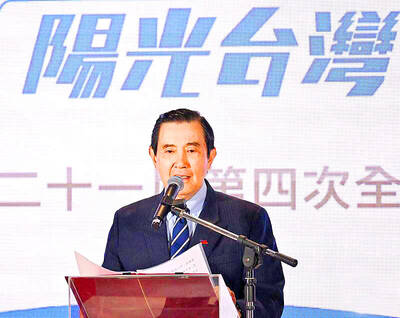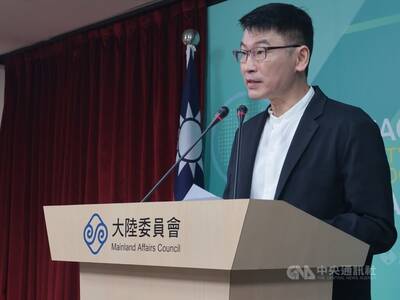Taiwan would rank No. 14 in the UN’s Information and Communications Technology Development Index for last year if it was included, up from No. 19 in 2016, the National Communications Commission (NCC) said yesterday, adding that the improvement was due to significant growth in Internet bandwidth.
The UN International Telecommunication Union calculated the index using data collected in 2016.
While Taiwan is not a member of the UN, the union would still send the government a questionnaire to help it research the development of information and communications technology (ICT) in the nation, the commission said.
The UN agency saves data gathered from governments worldwide in its database, which is used to compile the annual Measuring the Information Society Report, it added.
The report does not list Taiwan’s performance, the commission said, adding that it subscribes to the database to access the data.
The commission said it calculated the nation’s score and ostensible ranking in the index using the data and formulas stipulated by the union.
The UN agency creates the index of 176 countries based on three scores: ICT access rate, ICT users and ICT in relation to socioeconomic development, NCC spokesperson Wong Po-tsung (翁柏宗) said.
The commission is responsible for increasing ICT access and users, he said.
Taiwan was nominally ranked No. 3 in the world last year in ICT access rate, up from No. 5 in 2016, the commission said, adding that the nation’s fixed telephone line service penetration rate was 58.68 percent, down from 59.69 percent in 2016.
The mobile phone service penetration rate was 124.62 percent, down from 127.3 percent in 2016, the commission said, adding that Internet bandwidth averaged 717.567 kilobits per second (kpbs), up from 82.533 kbps.
The significant growth in Internet bandwidth resulted in an improved ranking in Internet access rate, which helped raise the nation’s would-be ranking in the index, Wong said.
The percentage of households that owned computers fell from 85.3 percent in 2016 to 83.1 percent last year, it said, adding that 82 percent of the nation’s households had Internet access, the same as in 2016.
However, the number of ICT users fell, dragging the nation’s ranking from No. 31 in 2016 to No. 35 last year, the commission said.
While the individual Internet usage rate rose from 78.04 percent to 79.75 percent, the fixed broadband service penetration rate declined from 24.26 percent to 24.23 percent, it said, adding that the mobile broadband service penetration rate rose from 80.2 percent to 92.85 percent.
ICT usage dropped because the National Development Council gathered data by calling household landlines, which inevitably resulted in many unanswered calls, Wong said.
The council has been advised that it should call mobile phones to gather more precise data, he said.
The fixed broadband service penetration rate fell because of increasing demand for mobile phone services, with many of the nation’s telecoms offering unlimited data plans, Wong said.
The commission would try to boost fixed broadband usage by increasing the number of corporate users, he said.
The mobile broadband service penetration rate could rise to 100 percent after the nation terminates 3G services at the end of this year, he added.

‘ANGRY’: Forgetting the humiliations and sacrifices of ‘the people of the Republic of China’ experienced disqualified Lai from being president, Ma Ying-jeou said Former president Ma Ying-jeou (馬英九) yesterday criticized President William Lai (賴清德) over what he called “phrasing that downplayed Japan’s atrocities” against China during World War II. Ma made the remarks in a post on Facebook on the 80th anniversary of the end of World War II. Ma said he was “angry and disappointed” that Lai described the anniversary as the end of World War II instead of a “victory in the war of resistance” — a reference to the end of the Second Sino-Japanese War (1937-1945). The eight-year war was a part of World War II, in which Japan and the other Axis

The Mainland Affairs Council (MAC) yesterday announced a ban on all current and former government officials from traveling to China to attend a military parade on Sept. 3, which Beijing is to hold to mark the 80th anniversary of the end of the Second Sino-Japanese War. "This year marks the 80th anniversary of the end of World War II and the Republic of China’s victory in the War of Resistance [Against Japan]," MAC Deputy Minister and spokesperson Liang Wen-chieh (梁文傑) told a regular news briefing in Taipei. To prevent Beijing from using the Sept. 3 military parade and related events for "united

‘OFFSHORE OPERATIONS’: Also in Dallas, Texas, the Ministry of Economic Affairs inaugurated its third Taiwan Trade and Investment Center to foster closer cooperation The 2025 Taiwan Expo USA opened on Thursday in Dallas, Texas, featuring 150 Taiwanese companies showcasing their latest technologies in the fields of drones, smart manufacturing and healthcare. The Taiwan External Trade Development Council (TAITRA), the event’s organizer, said the exhibitors this year include Hon Hai Precision Industry Co (Foxconn), the world’s largest contract electronics manufacturer; AUO; PC brand Asustek Computer; and drone maker Thunder Tiger. In his opening speech, TAITRA chairman James Huang (黃志芳) said he expected Texas to become a world-class center for innovation and manufacturing as US technology companies from Silicon Valley and Taiwanese manufacturers form an industrial cluster

A 20-year-old man yesterday evening was electrocuted and fell to his death after he climbed a seven-story-high electricity tower to photograph the sunset, causing a wildfire on Datong Mountain (大同山) in New Taipei City’s Shulin District (樹林), the Taoyuan Police Department said today. The man, surnamed Hsieh (謝), was accompanied on an evening walk by a 20-year-old woman surnamed Shang (尚) who remained on the ground and witnessed the incident, capturing a final photograph of her friend sitting atop the tower before his death, an initial investigation showed. Shang then sought higher ground to call for help, police said. The New Taipei